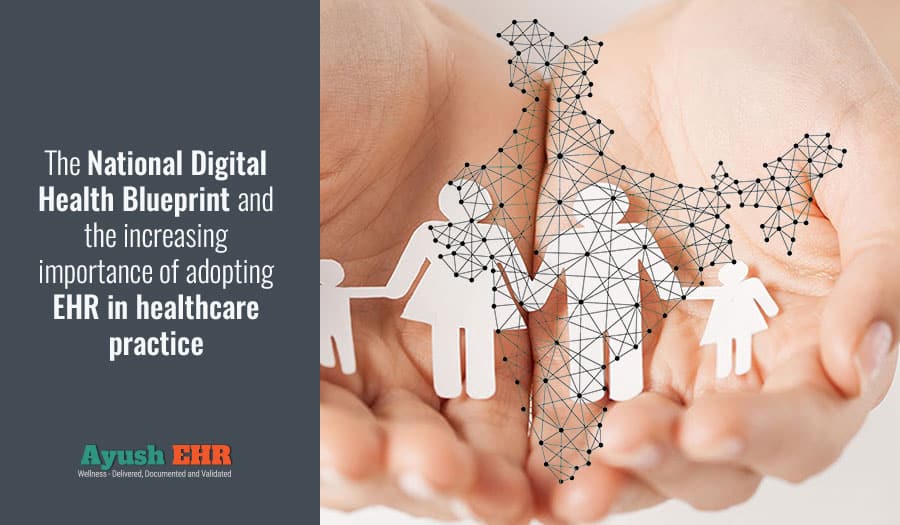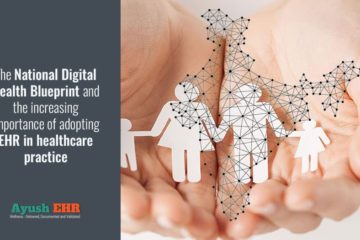The National Digital Health Blueprint and the increasing importance of adopting EHR in healthcare practice

The Digital India program was launched to make it easy for the citizens of the country to access all kinds of governmental services, using technology. Many initiatives have been introduced since then to leverage the core digital India program, especially in the financial sector towards improving financial inclusion of the previously excluded populations. Towards creating a similar impact in healthcare, a recent policy document outlining the technology framework – The National Digital Health Blueprint (NDHB) – has been placed in the public domain by the Union Health Minister Harsh Vardhan, for discussions and feedback. The NDHB aims to build a National Digital Health Eco-System, to create and share standards based health information(EHR) of Indian citizens securely and transparently. This is expected to help improve overall healthcare and also reduce the cost.
What is the National Digital Health Blueprint?
The NDHB has a single focused objective, to change healthcare ecosystem of the nation and make it more open, transparent and less expensive. Many unfortunate incidents, that happened recently, have raised the vital question of how the nation is going to manage it’s fast emerging Health Crisis. The recent loss of large number of innocent lives in Bihar, increasing incidences of outbreak of communicable diseases and the alarming increase in the incidences of non-communicable diseases evidently point to a worrying situation. The National Digital Health Blueprint is a robust effort to reduce or avoid numerous avoidable fatalities in Medicine and Healthcare. It is meant to be an Eco-system that supports Universal Health Coverage in an effective, affordable, inter-operable and standardized way. This architectural document attempts to establishes a framework of personal health data of citizens and how to achieve seamless exchange of the same.
What are the key goals of NDHB?
- Promoting EHR as a standardized form of tracking Health Records for patients in any medical institution. Improving its adoption in all healthcare centres to build an inter-operable digital health eco-system.
- Framework for a federated network to manage core digital health records of each citizen in an easy to access format that can be exchanged seamlessly.
- Investing in healthcare monitoring systems that focus on enabling international standards of care by enabling access to Personal Health Records(PHR) based on the consent of the individual.
- Improving the quality of healthcare with further research on the health data that is collected.
- Create systems to pro-actively detect and manage health related emergencies and epidermic across the nation.
These goals are intended to make healthcare consistent and predictable across the nation. They are expected to improve overall outcomes while reducing the overall cost.
Devi Prasad Shetty, Founder and Chairperson, Narayana Health said “When you admit a relative in a hospital, you tend to do a background check of the concerned doctor handling the case. But you do not do the same for the pilot when boarding an aircraft, even as over 200-300 lives depend on the experience and skills of the pilot. This is because irrespective of his or her experience, no pilot can fly the aircraft in his or her own style. Everything is pre-defined and documented and when things go wrong, steps are taken to ensure the same mistakes do not get repeated,” NDHB intends to bring this level of consistency and confidence to the Indian healthcare ecosystem.
‘The Anonymizer’ positioning EHR to greater heights
The NDHB has an entire sector that is dedicated to anonymizing data. This is specifically for research purposes where a patients’ data can be used by the researchers without compromising the privacy and confidentiality of the person. The blueprint states, “It takes data from the health locker and/or other health data sets, removes all personally identifiable information to protect privacy and provides the anonymised data to the seeker. Tools available can anonymise both structured and unstructured data. At the same time, Anonymiser enables the government or authorised agencies may need to access the health records of citizens especially in some identified cases such as monitoring of notified diseases etc., to take effective decisions to promote wellness in the country and to ensure that healthcare is provided in a timely fashion, as needed…”
It is time for India to join the world leaders in healthcare and also deliver it’s commitment to the humanity of ensuring Universal Health Coverage(UHC) to it’s citizens by 2030. While driving our economy to greater heights, we also need to encourage wellness and overall health of the nation.
How to secure the place for traditional practices in the future
Unfortunately traditional healthcare practices such as Ayurveda, Yoga & Naturopathy are far behind in technology adoption to join and support this initiative. Their inability do so will push them further down and reduce their adoption, if they do not integrate into the NDHB. The limited software options available are not compliant to standards and will find this a tough task to achieve.
We are AyushEHR are way ahead of the curve and have built our solutions ground up based on EHR standards. We are ready to integrate and join the NDHB as and when it becomes a a reality. So in case you wish to make your business competitive and build a differentiator, choose AyushEHR as your technology partner.


